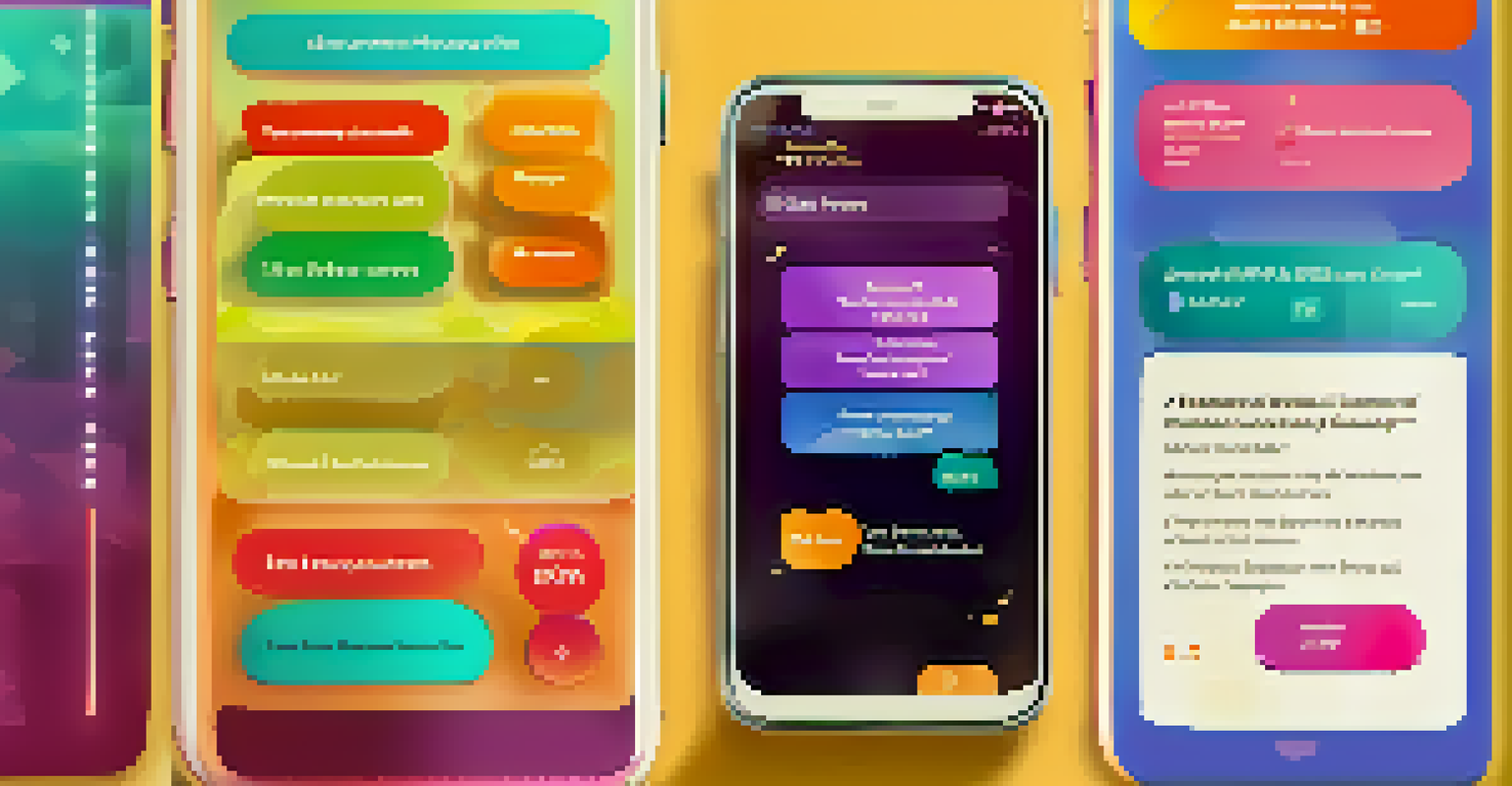The Future of Learning Management Systems in Education

The Evolution of Learning Management Systems Over Time
Learning Management Systems (LMS) have come a long way since their inception. Initially, they served as simple repositories for course materials, allowing students to access resources online. However, with advancements in technology, LMS platforms have now evolved into comprehensive systems that support various aspects of education, from assessments to communication.
The great thing about education is that every time you learn something new, it changes everything.
This evolution reflects a shift towards more interactive and engaging learning experiences. For example, today’s LMS can integrate multimedia elements, such as videos and interactive quizzes, which cater to different learning styles. This adaptability not only enhances student engagement but also improves knowledge retention.
As we look to the future, we can expect LMS tools to continue evolving. They will likely incorporate artificial intelligence, enabling personalized learning paths and adaptive assessments that meet individual student needs, ensuring that education is more effective and accessible than ever.
The Impact of Artificial Intelligence on LMS Functionality
Artificial Intelligence (AI) is set to revolutionize Learning Management Systems by making them smarter and more intuitive. With AI, LMS platforms can analyze student data to identify learning patterns and predict performance, allowing for tailored educational experiences. This means that students can receive personalized feedback and support, enhancing their learning journey.

For instance, imagine an LMS that learns a student’s strengths and weaknesses over time. By analyzing quiz results and engagement metrics, the system can recommend specific resources or activities to help improve areas where the student struggles. This kind of targeted support can lead to better outcomes and greater motivation.
AI Personalizes Learning Experiences
Artificial Intelligence enhances Learning Management Systems by tailoring educational experiences based on individual student data.
Furthermore, AI can automate administrative tasks, such as grading and attendance tracking, freeing up educators to focus on teaching. As these systems become more integrated into the educational landscape, they will help create a more efficient and personalized learning environment.
Enhancing Student Engagement Through Gamification
Gamification is a powerful tool that can significantly enhance student engagement within LMS platforms. By incorporating game-like elements, such as points, badges, and leaderboards, educators can motivate students to participate actively in their learning. This approach makes education more enjoyable and encourages a sense of competition and achievement.
Technology will not replace great teachers, but technology in the hands of great teachers can be transformational.
For example, an LMS might include a quest system where students complete various learning modules to earn rewards. This not only incentivizes participation but also fosters a sense of community as learners can share their achievements with peers. As a result, students are more likely to stay committed and engaged throughout their educational journey.
Looking ahead, we can anticipate even more innovative gamification strategies within LMS. As technology advances, these systems will likely incorporate augmented reality (AR) and virtual reality (VR) elements, making learning experiences even more immersive and interactive.
The Role of Mobile Learning in Modern LMS
In today's fast-paced world, mobile learning has become a crucial component of effective education. Learning Management Systems that are mobile-friendly allow students to access course materials and participate in discussions anytime, anywhere. This flexibility is essential for accommodating diverse schedules and learning preferences.
With the rise of smartphones and tablets, students can easily engage with their coursework while on the go. For instance, they can watch instructional videos during their commute or complete assignments during lunch breaks. This ability to learn in various contexts helps reinforce concepts and promotes continuous education.
Gamification Boosts Student Engagement
Incorporating game-like elements within LMS makes learning more enjoyable and encourages active participation among students.
As we move forward, the importance of mobile learning in LMS will only increase. Future developments may include more robust mobile applications that provide offline access to resources, enabling students to learn without internet connectivity, further enhancing accessibility.
Integrating Social Learning Features into LMS
Social learning is an approach that emphasizes collaboration and interaction among learners, and it's becoming an essential feature of modern Learning Management Systems. By integrating social tools, such as discussion forums and group projects, LMS platforms can create a sense of community and enhance peer-to-peer learning.
For example, an LMS might allow students to form study groups where they can collaborate on assignments or share resources. This interaction not only fosters a sense of belonging but also allows students to learn from each other, improving comprehension and retention of material.
As educational institutions increasingly recognize the value of social learning, we can expect LMS to further evolve. Future systems may leverage social media elements, enabling students to engage with their peers across platforms, thus enriching their educational experience.
The Importance of Data Analytics in LMS
Data analytics is a game-changer for Learning Management Systems, allowing educators to make informed decisions based on real-time insights. By analyzing student performance data, teachers can identify areas where students may be struggling and adjust their teaching strategies accordingly. This data-driven approach ensures that all students receive the support they need to succeed.
For instance, an LMS can track completion rates for assignments and quizzes, providing educators with a clearer picture of student engagement. If a significant number of students are falling behind, teachers can intervene early, offering additional resources or support to help them catch up.
Accessibility Benefits All Learners
Ensuring that Learning Management Systems are accessible fosters inclusivity, allowing students with diverse needs to fully engage in their education.
Moving forward, the integration of advanced analytics tools will further empower educators. With more sophisticated data visualization and reporting capabilities, teachers will be better equipped to enhance their instructional methods and create more effective learning environments.
Ensuring Accessibility and Inclusivity in Learning
Accessibility and inclusivity are critical considerations for the future of Learning Management Systems. As education becomes increasingly digital, it is essential that LMS platforms cater to diverse learners, including those with disabilities. This means incorporating features that provide equal opportunities for all students to succeed.
For example, an inclusive LMS might offer screen reader compatibility, captioned videos, and alternative formats for course materials. By prioritizing accessibility, educational institutions can ensure that all students, regardless of their abilities, can engage with the content and participate fully in their learning.

As we look ahead, the movement toward inclusivity will only grow stronger. Future LMS developments will likely focus on creating customizable learning environments that adapt to individual needs, promoting a more equitable educational landscape for everyone.
The Future of LMS: Trends to Watch
As we gaze into the crystal ball of educational technology, several trends are emerging that will shape the future of Learning Management Systems. From AI-driven personalization to enhanced mobile experiences, these developments promise to transform the way we approach learning. Keeping an eye on these trends is essential for educators and institutions to stay ahead.
One notable trend is the increasing focus on microlearning, which delivers content in small, easily digestible chunks. This approach caters to busy lifestyles and promotes better retention, making it a valuable addition to LMS platforms. Additionally, the rise of hybrid learning models will necessitate LMS that seamlessly integrate online and in-person experiences.
Ultimately, the future of Learning Management Systems is bright, with endless possibilities for improving education. As technology continues to advance, we can expect LMS to become even more dynamic, flexible, and responsive to the needs of learners, paving the way for a more enriched educational experience.